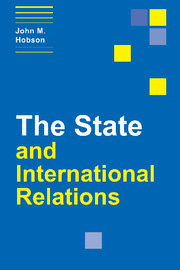Book contents
- Frontmatter
- Contents
- List of figures
- Acknowledgements
- 1 What's at stake in the ‘second state debate’? Concepts and issues
- Part 1 Traditional theories of the state and international relations
- Part 2 Recent sociological theories of the state and international relations
- 4 Marxism
- 5 Constructivism
- 6 Weberian historical sociology
- Part 3 Conclusion: proposing a ‘structurationist’ theory of the ‘constitutive’ state and global politics
- References
- Index
6 - Weberian historical sociology
Published online by Cambridge University Press: 31 March 2010
- Frontmatter
- Contents
- List of figures
- Acknowledgements
- 1 What's at stake in the ‘second state debate’? Concepts and issues
- Part 1 Traditional theories of the state and international relations
- Part 2 Recent sociological theories of the state and international relations
- 4 Marxism
- 5 Constructivism
- 6 Weberian historical sociology
- Part 3 Conclusion: proposing a ‘structurationist’ theory of the ‘constitutive’ state and global politics
- References
- Index
Summary
Introduction: the ‘two waves’ of neo-Weberian historical sociology
In the last decade, IR as a discipline has been undergoing a crisis as its master-paradigm, neorealism, is increasingly seen as limited, if not obsolete. Accordingly, IR is thought to have reached an impasse (Ferguson and Mansbach 1988; Halliday 1994). Why? It is perceived by critics that neorealism has many blind spots, four of which are: a lack of a theory of the state and an exaggeration of ‘structure’ to the detriment of ‘agency’ an inability to theorise the integrated nature of global politics, given the assumption that there is a fundamental separation or dichotomy between the international and national realms; a lack of a theory of international change; and a static a-historical approach. One response to the crisis of neorealism made by some IR scholars has been to turn towards neo-Weberian historical sociology (WHS) to provide a way out of the impasse (e.g. Jarvis 1989; Halliday 1994; Hobson 1997, 1998a; Hall 1998; Hobden 1998; Seabrooke 2000). Thus WHS is thought to offer a theory of the state that is allegedly missing in neorealism, given that WHS problematises the state, and seeks to describe and explain its origins, powers and changing configurations over time. This also allegedly offers a means to go beyond neorealist structuralism by bringing ‘agency’ back in. Secondly, WHS advocates an intimate relationship between the internal and external realms, thereby offering a potentially rich ‘integrationist’ approach. While Waltz actually recognises that the international can shape the national, he nevertheless dismisses the possibility that the national can shape the international realm. Thirdly, WHS provides a theory of change, which allegedly helps counter neorealism's static approach.
- Type
- Chapter
- Information
- The State and International Relations , pp. 174 - 214Publisher: Cambridge University PressPrint publication year: 2000



